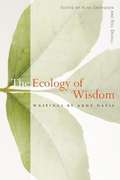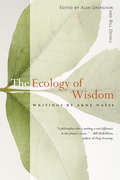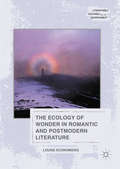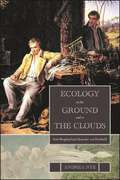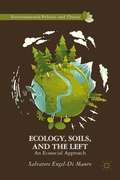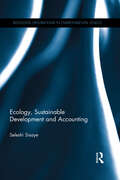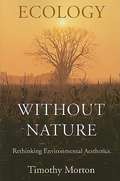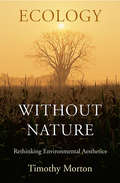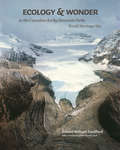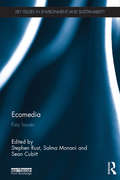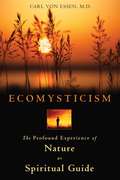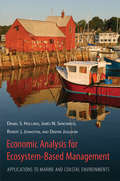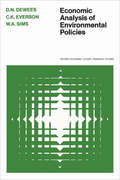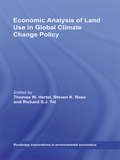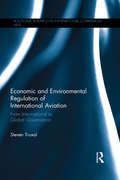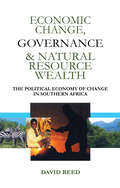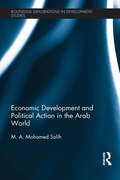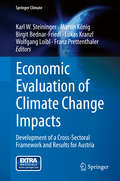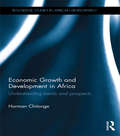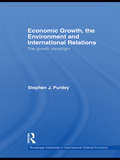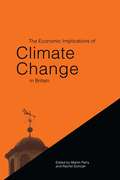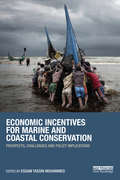- Table View
- List View
Ecology of Wildlife Diseases in the Neotropics
by Gerardo Acosta-Jamett Andrea ChavesThis contributed volume focuses on the Neotropical region, and explores the environmental, ecological and socio-economic components that facilitate the emergence of zoonotic diseases. This book highlights the primary ecological, environmental, social, and economic variables associated with the risk of maintenance, transmission, and dissemination of emerging, re-emerging, and neglected infectious diseases, in which Neotropical vertebrates are involved. It compiles up-to-date knowledge and research for the neotropical region, as well as discusses the current needs of knowledge improvement. The chapters include various examples of the cycles of infectious diseases, all with world-wide relevance where neotropical wild vertebrates are affected or involved.
Ecology of Wisdom: Writings
by Arne NaessA founder of the Deep Ecology Movement, Arne Naess' has produced articles on environmentalism that have provided unmatched inspiration for ecologists, philosophers, and activists worldwide. This collection amasses a definitive group of Naess' most important works in which he calls for nonviolent, cooperative action to protect the Earth. Rich with observations, insights, and anecdotes, Naess' writings draw from Eastern religious practices, Gandhian nonviolent direct action, and Spinozan unity systems. Playful and compassionate in tone, Ecology of Wisdom showcases Naess' exceptional enthusiasm, wit, and spiritual fascination with nature, while educating each of us about the steps we must take to rescue the planet and illuminating the relevance of this important environmental advocate.
The Ecology of Wisdom: Writings by Arne Naess
by Arne Naess Bill Devall Alan DrengsonA founder of the Deep Ecology Movement, Arne Naess' has produced articles on environmentalism that have provided unmatched inspiration for ecologists, philosophers, and activists worldwide. This collection amasses a definitive group of Naess' most important works in which he calls for nonviolent, cooperative action to protect the Earth. Rich with observations, insights, and anecdotes, Naess' writings draw from Eastern religious practices, Gandhian nonviolent direct action, and Spinozan unity systems. Playful and compassionate in tone, Ecology of Wisdom showcases Naess' exceptional enthusiasm, wit, and spiritual fascination with nature, while educating each of us about the steps we must take to rescue the planet and illuminating the relevance of this important environmental advocate.
The Ecology of Wonder in Romantic and Postmodern Literature
by Louise EconomidesThis book traces the aesthetic of wonder from the romanticperiod through contemporary philosophy and literature, arguing for itsrelevance to ecological consciousness. Most ecocritical scholarship tends toovershadow discussions of wonder with the sublime, failing to treat these twoaesthetic categories as distinct. As a result, contemporary scholarship hasconflated wonder and the sublime and ultimately lost the nuances that these twoconcepts conjure for readers and thinkers. Economides illuminates importantdifferences between these aesthetics, particularly their negotiation of issuesrelevant to gender-based and environmental politics. In turn, readers canutilize the concept of wonder as an open-ended, non-violent framework incontrast to the ethos of domination that often surrounds the sublime.
Ecology on the Ground and in the Clouds: Aimé Bonpland and Alexander von Humboldt (SUNY series in Environmental Philosophy and Ethics)
by Andrea NyeIn Ecology on the Ground and in the Clouds, Andrea Nye raises a question: In a time of climate change and environmental crisis, where should we look for inspiration? Is it to Alexander von Humboldt, the "inventor of nature" who viewed the cosmos from the lofty peak of Mount Chimborazo? Or is it to Humboldt's travel partner, the botanist Aimé Bonpland, who left Europe behind for forty years of conservation, agroforestry, and cooperative farming in the newly independent Republic of Argentina? For Bonpland, order and harmony are not unveiled with European reason and insight; they are made on the ground by intelligent, honorable, and diverse working men and women. Cosmos is not a hidden balance of nature; it is order in thought and action that ensures what we do is coherent and for the common good. It is fair and efficient government, just adjudication of disputes, and good management. It is loving attention to intricate "cogs and wheels" of natural processes at the same time as imagining new forms of beauty and stability in human communities and working landscapes.
Ecology, Soils, and the Left
by Salvatore Engel-Di MauroSoil degradation is real and global, even if the evidence is not so easy to glean. Degradation poses comparable risks to greenhouse gas emissions, deforestation, and nonhuman animal extinctions. Few have noticed soil degradation as the problem it has become, except most indigenous peoples in their struggles for survival.
Ecology, Sustainable Development and Accounting (Routledge Explorations in Environmental Studies)
by Seleshi SisayeAccounting literature has viewed sustainability in terms of social, economic and environmental performances. There have been concerns that the relationship between sustainability, accounting and organizational performance cannot be explained unless we can deduce patterns of administrative behaviour that chronicle management practices. Ecology, Sustainable Development and Accounting argues that, despite the broader social and economic development dimensions of sustainability and the limitations of its extension to corporate and organizational behaviour; an ecological framework is capable of providing the overall societal and community chronologies that describe corporate sustainable operations. Drawing examples from international development and federal government organizations, this book documents the link between ecology, corporate sustainable development, and sustainability accounting and reporting. It draws together the literature from several disciplines to elaborate the contribution of the ecological approach to sustainable development in the accounting literature. This book will be of particular interest to students, academics and practitioners in the areas of environmental studies, ecological economics, sustainable development studies, and social and environmental accounting. The sociological and anthropological perspectives make this book the first of its kind to apply the population ecology of sociology to both the sustainability and accounting literature.
Ecology Without Nature: Rethinking Environmental Aesthetics
by Timothy MortonIn Ecology without Nature, Timothy Morton argues that the chief stumbling block to environmental thinking is the image of nature itself. Ecological writers propose a new worldview, but their very zeal to preserve the natural world leads them away from the "nature" they revere. The problem is a symptom of the ecological catastrophe in which we are living. Morton sets out a seeming paradox: to have a properly ecological view, we must relinquish the idea of nature once and for all. Ecology without Nature investigates our ecological assumptions in a way that is provocative and deeply engaging. Ranging widely in eighteenth-century through contemporary philosophy, culture, and history, he explores the value of art in imagining environmental projects for the future. Morton develops a fresh vocabulary for reading "environmentality" in artistic form as well as content, and traces the contexts of ecological constructs through the history of capitalism. From John Clare to John Cage, from Kierkegaard to Kristeva, from The Lord of the Rings to electronic life forms, Ecology without Nature widens our view of ecological criticism, and deepens our understanding of ecology itself. Instead of trying to use an idea of nature to heal what society has damaged, Morton sets out a radical new form of ecological criticism: "dark ecology. "
Ecology without Nature: Rethinking Environmental Aesthetics
by Timothy MortonIn Ecology without Nature, Timothy Morton argues that the chief stumbling block to environmental thinking is the image of nature itself. Ecological writers propose a new worldview, but their very zeal to preserve the natural world leads them away from the "nature" they revere. The problem is a symptom of the ecological catastrophe in which we are living. Morton sets out a seeming paradox: to have a properly ecological view, we must relinquish the idea of nature once and for all. Ecology without Nature investigates our ecological assumptions in a way that is provocative and deeply engaging. Ranging widely in eighteenth-century through contemporary philosophy, culture, and history, he explores the value of art in imagining environmental projects for the future. Morton develops a fresh vocabulary for reading "environmentality" in artistic form as well as content, and traces the contexts of ecological constructs through the history of capitalism. From John Clare to John Cage, from Kierkegaard to Kristeva, from The Lord of the Rings to electronic life forms, Ecology without Nature widens our view of ecological criticism, and deepens our understanding of ecology itself. Instead of trying to use an idea of nature to heal what society has damaged, Morton sets out a radical new form of ecological criticism: "dark ecology."
Ecomedia: Key Issues (Key Issues in Environment and Sustainability)
by Sean Cubitt Stephen Rust Salma MonaniEcomedia: Key Issues is a comprehensive textbook introducing the burgeoning field of ecomedia studies to provide an overview of the interface between environmental issues and the media globally. Linking the world of media production, distribution, and consumption to environmental understandings, the book addresses ecological meanings encoded in media texts, the environmental impacts of media production, and the relationships between media and cultural perceptions of the environment.Each chapter introduces a distinct type of media, addressing it in a theoretical overview before engaging with specific case studies. In this way, the book provides an accessible introduction to each form of media as well as a sophisticated analysis of relevant cases. The book includes contributions from a combination of new voices and well-established media scholars from across the globe who examine the basic concepts and key issues of ecomedia studies. The concepts of "frames," "flow", and "convergence" structure a dynamic collection divided into three parts. The first part addresses traditional visual texts, such as comics, photography, and film. The second part of the book addresses traditional broadcast media, such as radio, and television, and the third part looks at new media, such as advertising, video games, the internet, and digital renderings of scientific data. In its breadth and scope, Ecomedia: Key Issues presents a unique survey of rich scholarship at the confluence of Media Studies and Environmental Studies. The book is written in an engaging and accessible style, with each chapter including case studies, discussion questions and suggestions for further reading.
Ecomysticism: The Profound Experience of Nature as Spiritual Guide
by Carl Von EssenExplores the philosophy, science, and spirituality of nature mysticism and its Green calling • Offers a solid bridge between spiritual practice and environmental activism • Reveals how we can heal the environment by renewing our connection to it • Shows how spiritual encounters in nature are healing the Nature Deficit Disorder of our psyches and bodies Many have been struck by a majestic moment in nature--a sole illuminated flower in a shady grove, an owl swooping silently across a wooded path, or an infinitely starry sky--and found themselves in a state of expanded awareness so profound they can feel the interconnectedness of all life. These trance-like moments of clarity, unity, and wonder often incite a call to protect and preserve the earth--to support Nature as she supports us. Termed “nature mysticism,” people from all cultures have described such experiences. However, the ever-increasing urbanization of the world’s population is threatening this ancient connection as well as the earth itself. In Ecomysticism, Carl von Essen explores nature mysticism through the recorded experiences of outdoor enthusiasts as well as scientific studies in biology, psychology, and neuroscience. Citing consciousness scholar William James and a variety of well-known nature lovers such as Ansel Adams, Henry David Thoreau, and Ralph Waldo Emerson, von Essen shows how the spiritual transcendence from an encounter in nature--like other mystical experiences--is healing the Nature Deficit Disorder of our psyches and bodies, leading to an expansion of our worldview and a clearer understanding of our self and of our natural world. Offering a solid bridge between spiritual practice and environmental activism, von Essen’s spiritual ecology reveals how only through a renewal of humanity’s spiritual connection to nature can we effect true environmental healing.
ECONOMIA 3D (EBOOK)
by Martin LousteauLa economía te resulta aburrida, ajena, difícil y sin alma? No desesperes. También puede hacerte reír, aprender y hasta darte un poco de esperanza. Para eso no hace falta ponerse solemnes: alcanza con redescubrir con nuevos ojos sus enseñanzas más valiosas. En estas páginas, Martín Lousteau se mueve como un guía experto entre los tópicos más diversos e inesperados. El rol de los bancos y del sistema financiero, los esquemas mentales inconscientes que orientan nuestras decisiones, el desarrollo, la relación entre el dinero y la felicidad, la economía del sexo y del deporte, el consumo desorientado, la desigualdad, la crisis argentina y la debacle mundial, la ecología y el cambio climático son algunas de las estaciones de este recorrido repleto de realidad, humor y conocimiento.
Economic Analysis for Ecosystem-Based Management: Applications to Marine and Coastal Environments
by Robert Johnston Daniel Holland James Sanchirico Deepak JoglekaOcean and coastal management regimes are increasingly subject to competing demands from stakeholders. Regulations must not only address fishing, recreation, and shipping, but also sand and gravel mining, gas pipelines, harbor/port development, offshore wind and tidal energy facilities, liquefied natural gas terminals, offshore aquaculture, and desalinization plants. The growing variety and intensity of ocean and coastal uses increases the call for a more holistic, comprehensive, and coordinated management approach that recognizes the often complex relationships between natural and human systems. For both economist and non-economist audiences, this book describes ways in which economic analysis can be an important tool to inform and improve ecosystem-based management (EBM). Topics include modeling economic impacts, benefit-cost analysis, spatial considerations in EBM, incentives and human behaviors, and accounting for uncertainty in policy analysis. Throughout the book the authors elucidate the different kinds of insights which can be gained from the use of different economic tools. In this rigorous and accessible work, the authors defy the conventional stereotype that economic perspectives necessarily favor the greatest commercial development. Instead, they demonstrate how comprehensive economic analyses consider the full range of potential services offered by marine and coastal ecosystems, including the conservation of biodiversity and creation of recreational opportunities.
Economic Analysis of Environmental Policies
by C. K. Everson Donald Dewees William SimsA framework is concisely presented for the economic analysis of pollution problems and for evaluating proposed solutions. The substantial recent literature on environmental economics is reviewed and related to Ontario environmental policy. Topics include the theory of externalities as an explanation of environmental problems, policy objectives, costs of information and monitoring, and the impact of these costs on control policy selection. Three case studies of specific pollution problems – sulphur dioxide from a smelter, lead from downtown factories, and urban automobile emissions – are given, and possible solutions explored. The authors' methodology is applicable not only to air and water pollution but also to noise, aesthetic degradation, and solid waste. This study will be welcomed by specialists, civil servants, and students trying to understand the economic aspects of environmental maintenance.
Economic Analysis of Environmental Policy
by Ross MckitrickThe relationship between economic growth and the environment is at the forefront of public attention and poses serious challenges for policymakers around the world. Economic Analysis of Environmental Policy, a textbook for advanced undergraduate and graduate courses, provides a rigorous and thorough explanation of modern environmental economics, applying this exposition to contemporary issues and policy analysis.Opening with a discussion of contemporary pollution problems, institutional players and the main policy instruments at our disposal, Ross McKitrick develops core theories of environmental valuation and optimal control of pollution. Chapters that follow cover issues like tradable permits, regulatory standards, emission taxes, and polluter liability as well as advanced topics like trade and the environment, sustainability, risk, inequality, and self-monitoring. Throughout, McKitrick uses clear, intuitive, and coherent analytical tools, so that students, academics, and practitioners can develop their policy analysis skills while comprehending the debates and challenges at the frontier of this exciting and rapidly-developing field.
Economic Analysis of Land Use in Global Climate Change Policy (Routledge Explorations in Environmental Economics)
by Thomas W. Hertel Steven K. Rose Richard S. J. TolLand has long been overlooked in economics. That is now changing. A substantial part of the solution to the climate crisis may lie in growing crops for fuel and using trees for storing carbon. This book investigates the potential of these options to reduce greenhouse gas emissions, estimates the costs to the economy, and analyses the trade-offs with growing food. The first part presents new databases that are necessary to underpin policy-relevant research in the field of climate change while describing and critically assessing the underlying data, the methodologies used, and the first applications. Together, the new data and the extended models allow for a thorough and comprehensive analysis of a land use and climate policy. This book outlines key empirical and analytical issues associated with modelling land use and land use change in the context of global climate change policy. It places special emphasis on the economy-wide competition for land and other resources, especially; The implications of changes in land use for the cost of climate change mitigation, Land use change as a result of mitigation, and Feedback from changes in the global climate to land use. By offering synthesis and evaluation of a variety of different approaches to this challenging field of research, this book will serve as a key reference for future work in the economic analysis of land use and climate change policy.
Economic and Environmental Regulation of International Aviation: From Inter-national to Global Governance (Routledge Research in International Commercial Law)
by Steven TruxalThe core structure of the regulatory regime for international civil aviation (the ‘Chicago System’) is inter–national. The features of the Chicago System were designed in an era when the world’s airlines were State–owned, and the most pressing international concerns were for navigation and safety regulation. Economic liberalization and intense globalization since the Second World War have impacted on the industry; today, it is global. This book observes the developing governance of global aviation, taking into account the concepts of sovereignty, jurisdiction and territoriality, and the proliferation of actors and participants as partners in a global public policy network, to posit that an upgraded system of global governance for civil aviation helps to explain the emerging complex landscape for global governance of civil aviation. As evidence of the emerging, complex matrix of governance of global aviation, this book identifies and reviews a selection of contemporary, transnational economic and environmental challenges facing the globalized aviation sector, e.g. fair competition safeguards, consumer protection, noise pollution and greenhouse gas emissions, and the respective ‘legal’ and policy actions taken at national level (United Arab Emirates, Qatar and People’s Republic of China), regional level (the European Union) and international level (UN Framework Convention on Climate Change and International Civil Aviation Organization). The book concludes that economic and environmental regulation of international aviation, designed for an inter–national world of yesterday, evolves into global governance of aviation, which is more suited for today’s global world. This book will be of particular interest to scholars and practitioners of aviation law, competition law and environmental law, as well as in the areas of transnational law, global governance and international relations.
Economic Change Governance and Natural Resource Wealth: The Political Economy of Change in Southern Africa
by David ReedThis volume analyzes the ways in which natural resource wealth has shaped authoritarian political regimes and statist economic systems in the countries of southern Africa in the post-colonial period. It consists of five essays. The first sets out the historical framework and emergence of natural resources as the crucial driver of economies in sub-Saharan Africa. Three essays, drawing on in-country research, focus on Tanzania, Zambia and Zimbabwe. They show how this explains the economic evolution of those countries - in particular, the impacts of economic and institutional changes on the bulk of the population, the rural poor. The final essay explores the nature of the changes and their neoliberal economic context, and the ways in which their harmful consequences might be relieved.
Economic Development and Political Action in the Arab World (Routledge Explorations in Development Studies)
by M.A. Mohamed SalihAnalysis of North African revolt against authoritarianism, known as the ‘Arab Spring’, embraced reductionist explanations such as the social media, youth unemployment and citizens’ agitations to regain dignity in societies humiliated by oppressive regimes. This book illustrates that reductionist approaches can only elucidate some symptoms of a social problem while leaving unexplained the economic and political structures which contributed to it. One outcome of quiescence, resource-based ethnic and sectarian conflicts and faulty development paradigm is deepened inequality and a wedge between winners and losers or affluence, wealth and power vis-à-vis poverty and hunger among humiliated jobless and hope-less masses. The book blends theories of development and transition to explain the complex factors which contributed to North Africans’ revolt against authoritarianism and its long-term consequences for political development in the Arab World. This timely book is of great interest to researchers and students in Development Studies, Economics and Middle Eastern Studies as well as policy makers and democracy, human rights and social justice activists in the Arab world.
Economic Evaluation of Climate Change Impacts
by Karl W. Steininger Martin König Birgit Bednar-Friedl Lukas Kranzl Wolfgang Loibl Franz PrettenthalerThis volume deals with the multifaceted and interdependent impacts of climate change on society from the perspective of a broad set of disciplines. The main objective of the book is to assess public and private cost of climate change as far as quantifiable, while taking into account the high degree of uncertainty. It offers new insights for the economic assessment of a broad range of climate change impact chains at a national scale. The framework presented in the book allows consistent evaluation including mutual interdependencies and macroeconomic feedback. This book develops a toolbox that can be used across the many areas of climate impact and applies it to one particular country: Austria.
Economic Growth and Development in Africa: Understanding trends and prospects (Routledge Studies in African Development)
by Horman ChitongeIn recent years, Africa has undergone the longest period of sustained economic growth in the continent’s history, drawing the attention of the international media and academics alike. This book analyses the Africa Rising narrative from multidisciplinary perspectives, offering a critical assessment of the explanations given for the poor economic growth and development performance in Africa prior to the millennium and the dramatic shift towards the new Africa. Bringing in perspectives from African intellectuals and scholars, many of whom have previously been overlooked in this debate, the book examines the construction of Africa’s economic growth and development portraits over the years. It looks at two institutions that play a vital role in African development, providing a detailed explanation of how the World Bank and the IMF have interpreted and dealt with the African challenges and experiences. The insightful analysis reveals that if Africa is rising, only 20-30 per cent of Africans are aboard the rising ship, and the main challenge facing the continent today is to bring on board the majority of Africans who have been excluded from growth. This book makes the complex, and sometimes confusing debates on Africa’s economic growth experience more accessible to a wide range of readers interested in the Africa story. It is essential reading for students and researchers in African Studies, and will be of great interest to scholars in Development Studies, Political Economy, and Development Economics.
Economic Growth, the Environment and International Relations: The Growth Paradigm (Routledge Advances in International Political Economy)
by Stephen J. PurdeyThe ubiquity of the commitment to economic growth, which Purdey refers to as the growth paradigm, is extraordinary. National governments around the world are seized of the same objective. Major international institutions such as the UN, the WTO, the World Bank, IMF and OECD, powerful international organizations such as regional trading blocs and multinational corporations – even civil societies of all kinds enthusiastically pursue a larger economic pie. This book examines the deep origins and rise to prominence of the commitment to economic growth. It explains why, despite the diversity of regime types, levels of development, cultures and other divisions typical of international relations, all major actors in the modern global polity pursue an identical political priority. Purdey critically examines the growth paradigm highlighting its normative foundations and its environmental impact, especially climate change. Using a neo-Gramscian approach, Purdey re-engages the ‘limits to growth’ controversy, identifying the commitment to growth as a form of utopianism that is as dangerous as it is seductive. By illuminating and interrogating the history, politics and morality of the growth paradigm, this book shifts the terrain of the limits debate from instrumental to ethical considerations. It will be of interest to students and scholars of political economy, international relations, environmental studies and ethics.
The Economic Implications of Climate Change in Britain
by Martin ParryClimate change could have a substantial economic impact, particularly on coastal states where seas level rises will be felt most strongly. Among these, the British Isles are likely to be significantly affected, and they provide an excellent case study of the consequences for specific sectors of the economy. In this book, leading experts - including several authors of reports by the Intergovernmental Panel on Climate Change and the UK Climate Change Impacts Review Group - examine the background and alternative scenarios for change, as well as its implications. They look in detail at water supply and management, agriculture and land use, energy, and the finance and insurance sector. In each case, they show how current activities will have to adapt and they conclude by evaluating the arguments for prevention now vs adaptation later. The changes in store could be huge, requiring the attention of academics and professionals from a wide range of disciplines and industries, as well as government action. This book makes a major contribution to understanding what is at stake.
Economic Incentives for Marine and Coastal Conservation: Prospects, Challenges and Policy Implications (Earthscan Oceans)
by Essam Yassin MohammedMarine and coastal resources provide millions of people with their livelihoods, such as fishing and tourism, and a range of critical additional ‘ecosystem services’, from biodiversity and culture to carbon storage and flood protection. Yet across the world, these resources are fast-diminishing under the weight of pollution, land clearance, coastal development, overfishing, natural disasters and climate change. This book shows how economic instruments can be used to incentivize the conservation of marine and coastal resources. It is shown that traditional approaches to halt the decline focus on regulating against destructive practices, but to little effect. A more successful strategy could be to establish schemes such as payments for ecosystem services (PES), or incorporate an element of financial incentives into existing regulatory mechanisms. Examples, both terrestrial and marine, from across the world suggest that PES can work to protect both livelihoods and environments. But to succeed, it is shown that these schemes must be underpinned by robust research, clear property rights, sound governance structures, equitable benefit sharing, and sustainable finance. Case studies are included from south and east Asia, Latin America, Africa and Australia. The book explores the prospects and challenges, and draws lessons from PES and PES-like programmes from across the globe.

